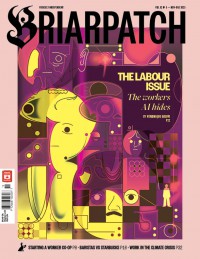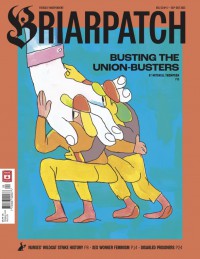-
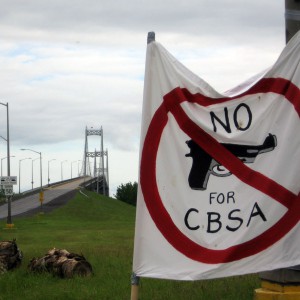 Magazine
MagazineA border runs through it
At midnight on May 31, 2009, the guards who manned the Canada Border Services Agency (CBSA) station on the Mohawk (Kahnienkehaka) reserve of Akwesasne, near Cornwall, Ontario, abandoned the Canadian side of the U.S.-Canada border and went home. The guards were to be issued 9-mm Beretta pistols on the following day as part of Canada’s border security policy, but had been warned by Akwesasne community groups that armed agents of the Canadian government would not be tolerated on their land.
-
 Magazine
MagazineSex work, migration and anti-trafficking
Nandita Sharma is an activist, scholar, and the author of Home Economics: Nationalism and the Making of ‘Migrant Workers’ in Canada (University of Toronto Press, 2006), and “Anti-Trafficking Rhetoric and the Making of a Global Apartheid” (_NWSA #17, 2005).
-
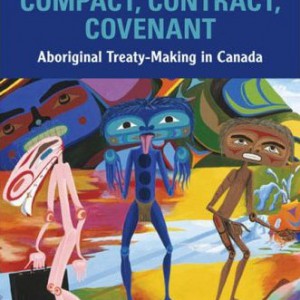 Magazine
MagazineForgotten histories of treaty-making
In Compact, Contract, Covenant, J. R. Miller provides the first comprehensive history of treaty-making in Canada. From the earliest days of trading partnerships and military alliances to modern comprehensive land claims, Miller explores the complex and shifting relations that guided the formation of treaties.
-
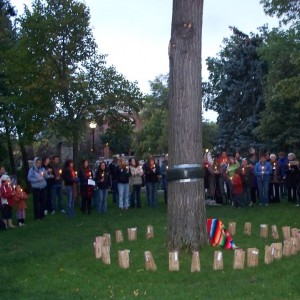 Magazine
MagazineStolen sisters
Some things defy articulation. How can a community conceptualize the vicious, racist misogyny that leaves scores of Aboriginal women missing and murdered? We try, because silence really is complicity — because we are all affected, we are all related and we do not accept the loss of these women.
-
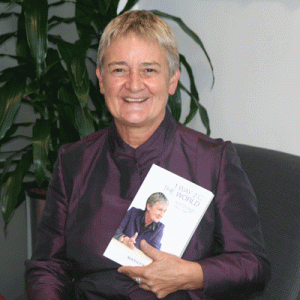 Magazine
MagazineNo one answer
Marilyn Waring’s decades-long career has been as varied as it has been influential. She was the youngest woman elected to the New Zealand Parliament, is a long-time activist for lesbian and gay rights, and has tended her own goat farm for many years. Waring recently spoke with Briarpatch about the state of women’s rights in the Global South and how women in the North can support southern resistance to economic inequality.
-
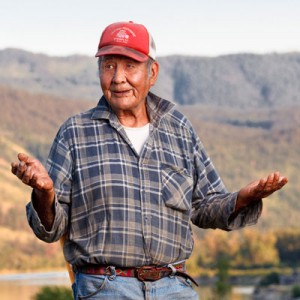 Magazine
MagazineWater fight in the Thompson Okanagan
“A lot of people have got their hearts broke, trying to make a living off this land without any water” Wolverine tells me. We are walking down the hill from his house towards a small field planted with flowering squash. His dog, Bingo, trails behind.
-
 Magazine
MagazineOld growth, new approach
In December 2007, the Council of the Haida Nation and the Government of B.C. ratified a Strategic Land Use Agreement for Haida Gwaii, also known as the Queen Charlotte Islands, off the north coast of B.C., following four years of participatory planning in island communities. The agreement is a bold challenge to traditional economic policy, representing a major shift from an export-driven, resource-based economy to an ecologically grounded approach to a sustainable economy on Haida Gwaii.
-

-
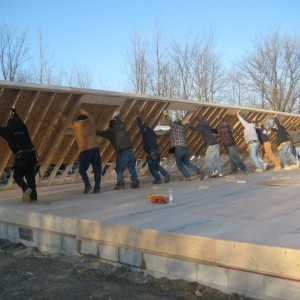 Magazine
MagazineStone by stone, rail by rail
What does the Mohawk cultural resurgence at Tyendinaga have to teach us about Aboriginal youth suicide prevention?
-
 Magazine
Magazine“We can no longer be sacrificed”
-
 Magazine
Magazine“Racism is a cowering thing
-
 Magazine
MagazineSettler Treaty Rights
Treaties are foundational agreements that provide a common framework for peaceful co-existence between First Nations and settlers. Some “treaty abolitionists” argue that treaties grant particular individuals special rights and privileges, creating inequality in our community—and therefore that “treaty rights” should be taken away. But they forget that we are all, in fact, treaty people. Treaties are two-party agreements that bestow rights and obligations upon both parties. Settlers too were granted generous treaty rights that they would be foolish to abrogate.

